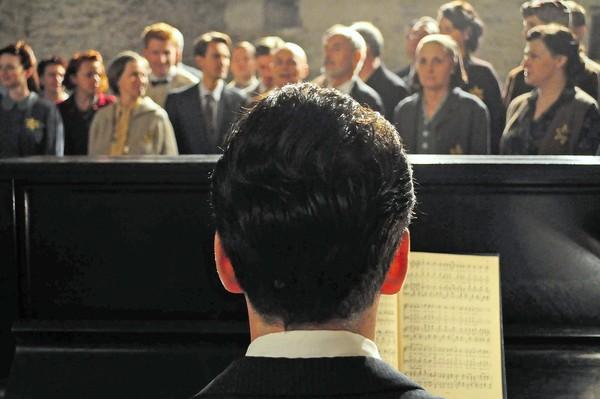
Rafael Schachter rehearses his choir in a basement in the concentration camp Terezin in the documentary “Defiant Requiem.” (Photo credit: Partisan Pictures)
It seems there are endless heartbreaking stories of unimaginable heroics in the face of the horrific realities of the Holocaust. “Defiant Requiem,” an unsteady but ultimately moving new documentary, tells one of them.
The film, directed by Doug Shultz, is anchored by two concerts, both of Verdi’s Requiem. One takes place in spring 1944 inside the prison camp Terezin where Jewish inmates performed the choral rage against death for their Nazi captors and Red Cross inspectors.
The other came in December 2010, when conductor Murry Sidlin realized his long-held dream of bringing the choral mass back to Terezin for a tribute performance.
Though the director opens the film with sobering shots of the empty prison and the final preparations for Sidlin’s concert, the story really begins with Raphael Schachter, who conceived and conducted the concentration camp performance.
Using archive footage, interviews with camp survivors, simple but powerful line-drawn animation, and unfortunately, badly executed reenactments, Shultz fills out the details of Schachter’s life and his legacy.
The young conductor’s passion for music was such that even long days of hard labor and little food could not dent it. Remarkably Schachter found a forgotten piano in a basement of one of the prison buildings and began playing nightly with a growing number of inmates slipping in to hear him.
Those sessions birthed a short-lived but incredible underground arts scene in Terezin, with the inmates putting on productions of all sorts. Some of the hand-drawn promotional posters for coming events survived Terezin and have become yet another statement about the power of art.
Schachter’s prison masterpiece was a production of Verdi’s Requiem, an extremely complicated piece that he taught his choral group line by line over many weeks. Several of the singers who survived the camp talk of those late-night practice sessions; how Schachter’s demand for excellence and the music itself made the days more bearable.
When the film swings back to Sidlin, it becomes a more traditional concert film, though, the behind-the-scenes shots of staging the production are made more stirring given the setting. The warehouse where the concert is ultimately held is a soaring open space with worn brick walls and high windows — there’s no hint of the horror that once transpired there.
But there is a kind of uncertainty that plagues “Defiant Requiem.” The film, narrated by Bebe Neuwirth, spends too much time away from Schachter and Sidlin, drifting into broad historical strokes, dense with details. It is better when it focuses on the two men. The seriously false note is in the reenactments.
In those unnecessary segments, stand-ins to try to reimagine Schachter’s time before Terezin — the promising artist who supported himself as a modest piano teacher. Musical scores line a bookshelf, with Requiem prominently displayed.
Schachter’s story and Sidlin’s homage were more than enough.



